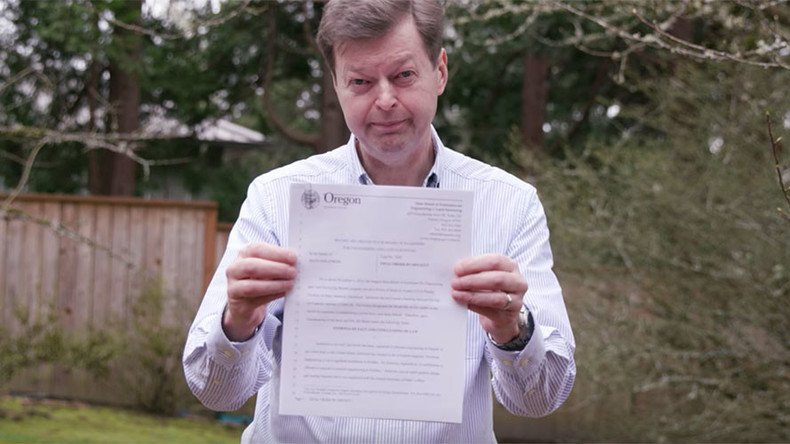Libertarians defend Swede fined $500 for pointing out flaw in US traffic lights

An engineer fined for disclosing the results of his independent investigation into the formula that regulates traffic lights has received legal backing from a law group claiming a violation of his First Amendment free speech rights.
In early 2015 Mats Järlström discovered a flaw in the mathematical formula used to regulate the timing of US traffic lights but was handed a $500 fine after disclosing his findings to authorities.
The Swedish electronics engineer, who has lived in the US for over 20 years, realized the flaw in the traffic systems after his wife received a fine from an automated traffic camera in Oregon.
Upon digging into the intriguing world of traffic light timing mathematics, Järlström concluded that a formula designed in 1959 accounted for only two yellow light scenarios: driving straight through, or stopping.
Following his discovery, the Swede set about trying to improve the formula by managing the transition time from yellow to red, so that a driver can travel through an intersection with a yellow light to slow down, without the system thinking they have broken a red light.
Serpent sins: Man fined $200 for not keeping snakes on a leash https://t.co/fsO7EKVZNxpic.twitter.com/81HUM4Bfj8
— RT (@RT_com) April 9, 2017
In 2015, Järlström decided it would be a good idea to share his findings with the media, policymakers and those interested in traffic technology but this is where the engineer ran into some difficulty.
On the back of Järlström’s discovery, the Oregon State Board of Examiners for Engineering and Land Surveying opened an investigation in August 2016 and announced that the curious Swede had engaged in unlicensed engineering and handed him a $500 fine which he duly paid.
Every state in the US regulates the practice of engineering and as Järlström isn’t licensed in the state he received the fine. He now fears that his ongoing interest in traffic light timing may land him with more fines or even jail time.
The engineer, buoyed by positive feedback after presenting his radical traffic light theories at a 2016 Institute of Transportation Engineers meeting, is now working on a potentially fine-inducing paper, though this time he has back up.
On his behalf, the Institute for Justice, a libertarian public interest legal group, filed a federal lawsuit last week in Portland’s US District Court, challenging the Beaver State’s Professional Engineer Registration Act.
The lawsuit claims that the act is in violation of Järlström's First Amendment right to free speech.
“Criticizing the government’s engineering isn’t a crime; it’s a constitutional right,” Sam Gedge, an attorney at the Institute for Justice, said in a press release.
“Under the First Amendment, you don’t need to be a licensed lawyer to write an article critical of a Supreme Court decision, you don’t need to be a licensed landscape architect to create a gardening blog, and you don’t need to be a licensed engineer to talk about traffic lights.”
“Whether or not you use math, criticizing the government is a core constitutional right that cannot be hampered by onerous licensing requirements,” said Gedge.
In an interview with The Register, Järlström said he felt “violated that I can't state who I am by saying 'I'm an engineer' and I can't even talk about traffic signals."
“I have this information I want to get out, however, I am literally blocked. I can be punished, even jailed for sharing this information and I think it's outrageous. We need to have freedom of speech to promote innovation," he added.













